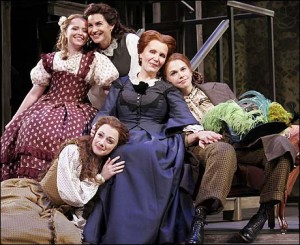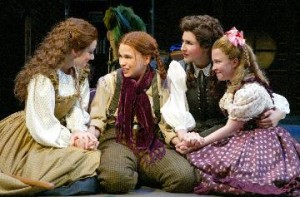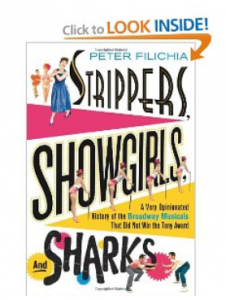MTI's account management portal, MyMTI, will be offline for planned system maintenance beginning 5:30 PM on Thursday April 24 to 9:00 AM on Friday April 25 (Eastern Time).
Filichia Features: Take a Chance on Little Women
Filichia Features: Take a Chance on Little Women
Even those super-intellectual students at Harvard University have been known to say on their rare off-hours “Hey, kids! Let’s put on a show!”
And so, an intrepid band of undergrads got together to do the musical version of Little Women, just in time for this week’s 181st anniversary of Louisa May Alcott’s birth. That the show, produced in Cambridge, was fewer than 20 miles up the road from Concord, where Alcott wrote the tale, added a bit of local color.
The kids booked the theater used every winter by the Hasty Pudding Club, the venerable organization that has been famous for presenting gag-and-drag-filled musical comedies since 1844. In contrast, the more serious Little Women shows the four penniless March sisters and their mother making sacrifices during the Civil War while Rev. March was administering to the troops. The musical has a great deal more to say than such Pudding shows as Kashmir If You Can and Bye Bye Verdi, and director Ally Kiley made certain that her cast said and sang it eloquently.
It’s an excellent showcase for college girls (and high school girls, too) because the four sisters are teenagers for most of the show. Jo is supposed to be 19 when the musical begins, but she’s soon three years younger when it flashes back. That means that Meg is 17, Beth is 14 and Amy is 13.
Jo is the most recalcitrant of the bunch, and so a director and actress must ensure that the character doesn’t come across as a shrew. Here Kiley and Taylor Kay Phillips were wonderfully successful. When her neighbor Professor Bhaer wasn’t that enthusiastic about the story that Jo had written, Phillips showed a perfect blend of emotions in “Better,” her first big number. She mixed a feisty feeling of “His loss!” and a soulful “Hmmm, maybe there is room for improvement.”
That’s the key to the character. Jo should think and pause a moment each time her temper is about to get tempestuous. She must let us see that she wants to handle matters as diplomatically as possible. She may not be able to, but this Harvard student certainly gave it the ol’ college try.
The other cast members had a good deal of fun while enacting Jo’s 19th century mellerdrama that had “blood and guts on ev’ry page. Read Shakespeare,” Jo advised, and Phillips said the line with the assurance that her knowledge was incontrovertible.
Although the sisters weren’t 100% behind Jo in her theatrical endeavors, they at least co-operated and didn’t discourage her – which is more than we can say for their Aunt March. She out-and-out criticized Jo for her “senseless stories that try to save the world.” Rachel Orol was superb at giving Aunt March a suck-a-lemon face as well as the haughtiness and belief that she has all the answers.
(Every theater company has at least one know-it-all in its ranks. Here’s the chance to typecast one of them.)
Aunt March, however, wasn’t above buying love from her niece, negotiating and carrot-dangling a trip to Europe – but only if Jo behaved in the strait-laced, conventional way that women in those days were known to do. That Jo excitedly responded to her aunt’s “invitation” by saying “Do you know how important it is for a writer to travel?!” showed that she wasn’t just out to have a mindless good time; she planned to profit from the adventure, fully believing that it would provide her with rich fodder for upcoming stories. Phillips admirably conveyed that subtext.

But there’s no such thing as a free trip. Because Jo didn’t meet Aunt March’s standards of ladylike behavior – as Amy did – Jo was left behind in favor of her youngest sister. (Well, that’s what happens when you spit on the palm of your hand before you shake someone else’s.) There’s that famous cliché that “Good girls go to heaven but bad girls go everywhere.” Not in Little Women; here, it’s the good girl who gets to go everywhere.
And yet, when Aunt March reneged on the invitation and chose Amy, here too Kiley and Phillips did not make Jo rude. The young actress conveyed that Jo preferred to be herself than compromise her principles just for a trip abroad. By this point in her life, Jo had come to terms with the fact that most people just simply didn’t understand her.
Laurie did better than many. Jeremy Venook aptly showed a young man who fell in love with Jo for the right reasons: he admired her brain, humor, style and independence. He was even able to put aside the humiliating fact that Jo could outbox him – and did. Jo in turn liked him because he took her seriously.
But she didn’t like him enough. When Laurie told Jo that he’d been admitted to a faraway college but couldn’t bear to leave her, all she could see was his chance to get a great education. The audience realized that if the positions had been reversed, Jo would have given Laurie a quick kiss before bounding up the stairs two at a time to go pack.
However, Phillips conveyed that she didn’t love Laurie less but that she loved her independence more. Yes, Jo would eventually accept a dinner date with a publisher, but that was business – and if there’s one thing Jo was, it’s all business. When her mother needed money to finance a trip to see her husband, Jo was the only sister who thought to sell her hair to finance the trip. (You’ll need either a long or short wig, depending on the actress you cast, to provide the contrast in hair styles.)
Laurie and Amy eventually fell in love, and while Jo had second thoughts about losing the man with whom she had so much in common, she had to be a good sport about the turn of events; after all, she’d had her chance and had made her decision. Once again, Phillips showed great bravado in the face of devastation.
She had another hurdle to overcome when Professor Bhaer expressed his love for her. Jo mustn’t seem as if she’s rebound, so Phillips established early on that she had great respect and feeling for the man even when warring with him. Having set that up, adding love to the mix wasn’t so hard.
Meanwhile, Amy’s trip to Europe had certainly broadened her horizons, and Page Axelson displayed her newfound sophistication in the perfect matter-of-fact way. If Amy had come back lording it over everyone that she was now superior to her sisters because she’d seen the world, we’d tire of her pretty quickly. The charming personality that Axelson showed made us happy she’d had the experience.
Axelson couldn’t be too self-absorbed, anyway, because her joy had to be tempered with grief. She regretted that she missed saying goodbye to her doomed sister Beth, who had died from scarlet fever. Kiley ensured that Beth, played by Olivia Miller, was brave and yet let us see that she was steadily deteriorating.

Also mourning Beth’s death was Mr. Laurence, Laurie’s grandfather. Joseph Seering showed how music can soothe the savage beast, for Beth’s pianoforte changed his opinion of her. Soon he was so enthusiastic at her talent that he replaced her workaday piano with a better one. (Ideally, you should have two pianos: one perfunctory, one ornate.) Mr. Laurence is also a good role for a board member – especially one who can play the piano.)
How wonderful Charlotte McKechnie was as “Marmee,” the girls’ mother. Mrs. March must keep everything running smoothly and make peace among the family members. She must also act as if there isn’t any danger so to not scare her daughters, all the while masking her own considerable fears for five females living alone in wartime. Only when she is alone and writing a letter to her husband do we see what’s really on her mind; McKechnie was full of eyes-closed emotion.
So later, when Jo was still mourning Beth and having second thoughts about losing Laurie, McKechnie had to revive her once-indefatigable daughter’s spirits. What a magnificent role model this woman is.
Traditionally, the most beautiful sister of a brood is the one who has the most confidence – but Meg is the sister who needs the most coaxing in learning how to dance. The very pretty Tess Davison showed that looks aren’t all that’s needed to be thought attractive and accomplished.
Little Women merely has a cast of ten, so there are few cameos -- although you could use some cameos for the costumes. Yes, time to roll out those hoop skirts that have lain dormant backstage.
Do the costumes alone make Little Women sound terribly dated? In one way, it is, for Alcott’s work does suggest that even a woman as independent as Jo should wind up with a man of her own (although Alcott never did). And yet, we can think of Jo as a forebear of today’s woman who is on the fast track to CEO status.
Dated or not, the Cambridge audience, mostly made up of young people, enjoyed themselves immensely. College-age theatergoers enjoy seeing kids from the past have trouble expressing their feelings for the opposite sex; they like to laugh and gently mock them for their inability to “come right out with it.”
One part of Little Women is, sad to say, still relevant: lovers are separated by war. Let’s hope that by the time you do the show, that won’t be true for any American soldier. Until that happens, your production of Little Women, as Ally Kiley’s did here, will remind everyone that there is nothing little about a loving family.

You may e-mail Peter at pfilichia@aol.com. Check out his weekly column each Tuesday at www.masterworksbroadway.com and each Friday at www.kritzerland.com. His new book, Strippers, Showgirls, and Sharks – a Very Opinionated History of the Broadway Musicals That Did Not Win the Tony Award is now available at www.amazon.com.


























